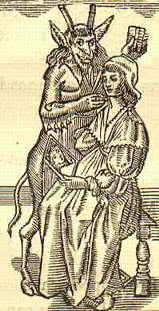Hamlet and the women in his life
Did Hamlet love Ophelia? He both says he did, and didn't*. Why does he so passionately reject Gertrude's sexuality, urging her to abstinence*?
Modern interpretations of the play propose strong psychological motivation for him-- Freud has taught us much about such states of mind--but in part he is responding to Renaissance stereotypes of women.
Eve or the Virgin Mary: women were seen as either terribly flawed or as paragons of virtue. Since few real women approach perfection, they are seen as evil, especially vulnerable to the Devil and his wiles. Ophelia must therefore head for the nunnery, or she will inevitably be corrupted. Gertrude has already fallen.
Footnotes
-
He loves her, he loves her not . . .
Hamlet contradicts himself within five lines:
Hamlet: . . . I did love you once.
Ophelia: Indeed, my lord, you made me believe so.
Hamlet: You should not have believed me, for virtue cannot so inoculate our old stock but we shall relish of it. I loved you not.
(Hamlet, 3.1.115-19; Hamlet is referring to the effect of original sin.) -
Hamlet on abstinence
O shame, where is thy blush? Rebellious hell,
If thou canst mutin[y] in a matron's bones,
To flaming youth let virtue be as wax
And melt in her own fire . . .
Good night--but go not to my uncle's bed.
Assume a virtue if you have it not.
(3.4.83-86, 160-61)
